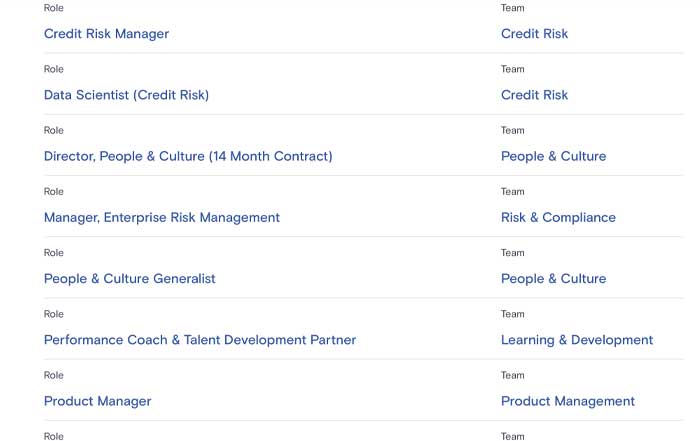Australia's fintech sector has been experiencing rapid growth in recent years, with the country emerging as a global leader in the adoption and development of financial technology solutions. As the industry continues to evolve, the demand for skilled professionals in various fintech roles has surged, with companies seeking individuals who can drive innovation, enhance customer experiences, and ensure regulatory compliance. Today we will explore the top fintech jobs in Australia for 2024, providing insights into job descriptions, salary ranges, and the market landscape for each position.
1. Enterprise Architect
Enterprise Architects are responsible for overseeing and maintaining a company's IT services and networks, ensuring they align with the organization's strategic goals. These professionals must possess a deep understanding of the latest trends in technology and the ability to engage with senior stakeholders across the business. They use their technical expertise, along with strong influencing and negotiation skills, to shape the technical direction and future state of the IT environment. Enterprise Architects in Australia can expect to earn an average salary of $240,000 per year for permanent positions or $175 per hour for contract roles.
2. Cybersecurity Manager
As cybersecurity threats continue to evolve, the role of the Cybersecurity Manager has become increasingly crucial in the fintech industry. These professionals are responsible for developing and implementing security strategies to protect an organization's systems, data, and assets from potential breaches. They work closely with IT teams to identify vulnerabilities, implement security controls, and monitor for suspicious activity. Cybersecurity Managers in Australia can expect to earn an average salary of $222,000 per year for permanent positions or $170 per hour for contract roles.
3. Business Intelligence Architect
Business Intelligence Architects are responsible for designing and implementing data analytics solutions that help organizations make informed decisions. They work closely with stakeholders to understand business requirements and translate them into technical solutions. These professionals must possess strong skills in data modeling, data warehousing, and business intelligence tools. Business Intelligence Architects in Australia can expect to earn an average salary of $210,000 per year for permanent positions or $150 per hour for contract roles.
4. Infrastructure Architect
Infrastructure Architects are responsible for designing and implementing the underlying infrastructure that supports an organization's IT systems. They work closely with IT teams to ensure that the infrastructure is scalable, reliable, and secure. These professionals must possess strong skills in cloud computing, virtualization, and network design. Infrastructure Architects in Australia can expect to earn an average salary of $200,000 per year for permanent positions or $152 per hour for contract roles.
5. Solutions Architect
Solutions Architects are responsible for designing and implementing complex technology solutions that address specific business requirements. They work closely with stakeholders to understand their needs and translate them into technical requirements. These professionals must possess strong skills in project management, solution design, and stakeholder management. Solutions Architects in Australia can expect to earn an average salary of $200,000 per year for permanent positions or $150 per hour for contract roles.
6. Senior Data Scientist
Senior Data Scientists are responsible for applying advanced statistical and mathematical concepts to help organizations derive insights from data. They work closely with data analysts and business stakeholders to identify opportunities for data-driven decision making. These professionals must possess strong skills in machine learning, artificial intelligence, and data mining. Senior Data Scientists in Australia can expect to earn an average salary of $190,000 per year for permanent positions or $140 per hour for contract roles.
7. Program Manager
Program Managers are responsible for overseeing the delivery of complex projects that involve multiple teams and stakeholders. They work closely with project managers to ensure that projects are delivered on time, within budget, and to the required quality standards. These professionals must possess strong skills in stakeholder management, risk management, and change management. Program Managers in Australia can expect to earn an average salary of $200,000 per year for permanent positions or $150 per hour for contract roles.
8. Product Manager
Product Managers are responsible for defining and driving the development of fintech products and services. They work closely with cross-functional teams, including engineering, design, and marketing, to ensure that products meet customer needs and align with business objectives. These professionals must possess strong skills in market analysis, user research, and product roadmapping. Product Managers in Australia can expect to earn an average salary of $180,000 per year for permanent positions or $140 per hour for contract roles.
9. Software Engineering Manager
Software Engineering Managers are responsible for leading and managing teams of software engineers who develop fintech applications and systems. They work closely with product managers and stakeholders to define technical requirements and ensure that projects are delivered on time and to the required quality standards. These professionals must possess strong skills in people management, technical leadership, and agile methodologies. Software Engineering Managers in Australia can expect to earn an average salary of $170,000 per year for permanent positions or $130 per hour for contract roles.
10. Compliance Manager
Compliance Managers are responsible for ensuring that fintech organizations adhere to relevant laws, regulations, and industry standards. They work closely with legal and risk teams to develop and implement compliance frameworks, monitor for compliance breaches, and report on compliance status. These professionals must possess strong skills in regulatory analysis, risk management, and stakeholder engagement. Compliance Managers in Australia can expect to earn an average salary of $160,000 per year for permanent positions or $120 per hour for contract roles.
The Fintech Market in Australia
Australia's fintech sector has been experiencing rapid growth in recent years, with the country emerging as a global leader in the adoption and development of financial technology solutions. Back in 2019 alone, the $3.8 billion Australian fintech sector saw a 252% growth in investment. With more than 40% of consumers yet to become fintech adopters, the market is predicted to grow further to $18 billion by 2030.
Australia's fintech sector is driving advancements in banking and payments, credit and lending, insurance, and wealth management, opening global financial services to more than just banks. Melbourne, in particular, offers an unrivaled opportunity to develop cutting-edge fintech products and services and take them to the world. The city is home to some of the biggest fintech players, as well as five homegrown unicorns collectively valued at over US$30 billion.
The fintech market in Australia is characterized by several notable attributes, including:
- The fourth largest pool of managed funds in the world, valued at US$2.1 trillion in 2019
- The number one position in the world for contactless payments, with two in every three payments at point of sale now contactless
- One of the highest penetrations of smartphones in the world, at around 80%
- One of the fastest growing markets in the world for fintech adoption rates
- A global leader in the Buy Now Pay Later (BNPL) market, with nearly two million Australians, or almost one in ten, using a BNPL product in 2019
- A high cloud-based adoption rate, with 42% of businesses using paid services
- The tenth largest ecommerce market in the world by revenue, reaching $32 billion in 2019
Australia's fintech sector also benefits from favorable regulatory settings, including the Australian Securities and Investments Commission's (ASIC) Enhanced Regulatory Sandbox, which allows fintech companies to test their services for up to 24 months without an Australian financial services licence or credit licence. The country has also implemented open banking and customer data right legislation, as well as a new payments platform that provides open access infrastructure for fast payments.
Australian Fintech Salary Comparison
Opportunities in the Australian Fintech Market
The Australian fintech market presents several opportunities for growth and innovation across various sub-sectors, including:
Money Transfer and Payments
Fintech adoption in Australia is steadily increasing, driven by greater use of money transfer and payments, particularly peer-to-peer payments and non-bank money transfers. Continued growth in customer digital adoption provides an opportunity for firms to create more services and improve customer engagement through mobile devices and AI.
Regulation Technology (RegTech)
Australia is home to the highest number of regulation technology companies in the Asia Pacific and the third largest RegTech sector in the world, behind the US and UK. With recent reforms in Australia's banking, superannuation, and financial services industry, RegTech will become of paramount importance to ensure compliance and transparency within a rapidly evolving banking and securities market. Melbourne is rapidly emerging as a market for cybersecurity solution services, with the financial services sector estimated to account for 50% of the local cybersecurity market.
Superannuation Services
There is a greater focus on the superannuation sector as a source of capital for fintech startups. As a relatively untapped market, there is an opportunity for fintechs to engage with superannuation funds to create individualized experiences for their members and provide cost-effective advice.
Insurance Services
The insurance sector in Australia is showing considerable growth, with significant opportunities for innovation. Australian incumbents are leveraging partnerships to develop innovative insurance products and deliver services that better align with customer expectations.
Case Studies: Fintech Companies in Australia
Australia's fintech sector is home to a diverse range of companies, from global giants to innovative startups. Here are a few examples of successful fintech companies operating in the country:
Airwallex is a global fintech platform that provides cross-border payments and treasury solutions for businesses of all sizes. Founded in Melbourne in 2015, the company has grown rapidly, raising over $800 million in funding and achieving a valuation of over $5.5 billion.
Afterpay is a leading Buy Now Pay Later (BNPL) platform that allows customers to purchase items and pay for them in four interest-free installments. Founded in Melbourne in 2014, Afterpay has since expanded to the US, UK, Canada, and New Zealand, and has a market capitalization of over $30 billion.
Judo Bank is a challenger bank that provides lending solutions to small and medium-sized businesses. Founded in 2016, the company has raised over $1 billion in funding and has a focus on relationship banking and personalized service.
Tyro Payments is a leading provider of EFTPOS and integrated payments solutions for businesses in Australia. Founded in 2003, the company has grown to become one of the country's largest independent payment processors, with a market capitalization of over $1.5 billion.
Finance Finale
Australia's fintech sector is poised for continued growth and innovation in 2024 and beyond. With a strong talent pool, favorable regulatory environment, and a rapidly growing market, the country offers ample opportunities for fintech professionals and companies alike. By focusing on key areas such as money transfer and payments, regulation technology, superannuation services, and insurance services, Australian fintechs can drive the industry forward and deliver innovative solutions to customers across the country and around the world.




